Cats and dogs must undergo a quarantine period in Australia. We provide this service at the Post-Entry Quarantine Facility in Mickleham near Melbourne, Australia.
Our facility provides high quality care for your cat or dog during quarantine.
Read more about quarantine and fees.
Read more about bringing cats and dogs to Australia.
Take a behind-the-scenes tour of our world-class Post Entry Quarantine facility in Mickleham, Victoria in the following video.
Tim: Welcome to post entry quarantine – our world-class biosecurity facility for plants and animals entering Australia.
This is where your pets are cared for, and diseases like rabies are prevented from entering the country.
Animal handler: [feeding dog] Over here, over here, sit, good boy, there you go! You’re not hungry?
Tim: I’ve been lucky today to come to our quarantine facility for cats and dogs that have flown into Australia and to meet a bunch of the handlers that are caring for them. This is a place that’s full of love for your pet. Each pet has its own individual accommodation with heated floors and bedding, and they’re given lots of time outdoors to exercise.
There are on-site vets to care for your pet’s needs.
Animal handler: The best part of the job is looking after the animals really. I love animals, I think we all do here so, being able to care for them, making sure they get the right care, um, is probably the best part of the job.
We’re all trained to monitor them quite closely for any health conditions or anything that we are concerned about so we will be in contact if we are concerned. So, yeah, just trust us.
Tim: Most pets come here to our quarantine facility in Victoria. It’s a sophisticated and safe facility where our biosecurity staff get to do exactly what they love best: care for animals.
When the quarantine period is over, it’s time for owners to reunite with their loved pet, like Watson’s owners who are so excited to see him today after bringing him from the United States.
Animal handler: [speaking to Watson’s owners] are you excited?
Watson’s owners: We’re so excited!
[Owners interacting with dog] Good boy, you look so great, you look so healthy! You can tell he is taken care of really well.
They kept us updated quite a bit. We got quite a few emails and also you know, telling us how he was doing, and how much of a happy dog he is, and I think that made us very comfortable with it all.
Tim: So, if you’re importing a cat or a dog into Australia make sure you follow all our Biosecurity rules. And help keep Australia rabies free.
Make a booking
Note: We do not recommend you use the Post Entry Biosecurity System on a mobile phone. Please use a desktop web browser to make a booking.
Submit your reservation for quarantine as soon as your import permit is granted to avoid any disappointment or delays with your animal’s intended arrival date.
We will assess reservation submissions within 7 days of receipt.
Make a booking online for the post entry quarantine (PEQ) facility.
Once you receive notification we have approved your reservation, you should conduct pre-export examinations, treatments and blood tests to comply with the import conditions and reservation date.
Government operated cat and dog post entry quarantine services are provided in Mickleham, in Melbourne, Victoria.
Also accepted at the facility are:
- Avian
- Horses
- Plants
- Ruminants
- Bees.
Most cats and dogs that require post entry quarantine isolation (group 2 and 3) must arrive on an international flight into Melbourne International Airport to undergo quarantine at the Mickleham Post Entry Quarantine (PEQ) Facility.
Cats and dogs may temporarily be transhipped via Sydney to the quarantine facility in Melbourne under limited circumstances and subject to eligibility.
Please note: If there are no direct flights from your country of export into Melbourne International Airport you must arrange an approved overseas transhipment. Your airline or a pet transport agent can assist you in meeting these flight requirements.
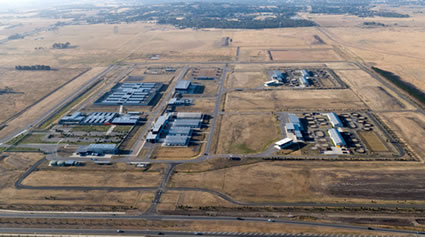
Victoria 3064

Post Entry Quarantine Facility
Phone: 1800 900 090 or +61 3 8318 6700 (outside Australia)
Fax: +61 3 9391 0860
Email: Invoicing, Bookings & General Inquiries
Hours: Monday – Friday (8: 00 – 16 : 00 hours )
Weekends and Australian Public Holidays: Closed
‘The person in charge of the animal’ is the person listed as the importer on the import permit. They are responsible for:
- ensuring the animal meets all import conditions, as a non- compliance may delay the animal’s release or require the animal to be exported out of Australia
- collecting the animal on completion of the quarantine isolation period
- paying all associated fees.
The importer may give permission for someone else to act as their authorised agent. Other persons may include a pet transport agency, family member or a friend. The importer must give this permission in writing and include the functions they authorise the agent to undertake on their behalf . For example, to receive information about an animal, collect the animal on completion of the quarantine isolation period, and authorise private veterinary treatment if required.
The importer can give this permission at any stage throughout the quarantine process, however it is preferable for it to be provided before the animal arrives.
The importer is also responsible for ensuring contact details for themselves and authorised agents are up to date both before their animal/s arrives and throughout the quarantine isolation period. It is important to provide your Australian contact details so we can contact you in the event of an emergency.
Find out about fees and payments for government animal quarantine facilities for cats and dogs.
Note: We do not recommend you use the Post Entry Biosecurity System on a mobile phone. Please use a desktop web browser to make a booking.
Note: We do not recommend you use the Post Entry Biosecurity System on a mobile phone. Please use a desktop web browser to make a booking.
You can make a booking at the Mickleham PEQ Facility once we have granted your animal an import permit . Being granted an import permit does not guarantee accommodation availability. At times, waiting periods may apply.
Once you/your pet transport agent has made a booking through the online system, you will receive notification of the next steps to complete your booking, including timeframes. This will include paying for the known quarantine fees and providing further details such as flight and air way bill details. You/your pet transport agent can get these details from your airline.
We will only grant approval to your airline to uplift animals with a confirmed booking.
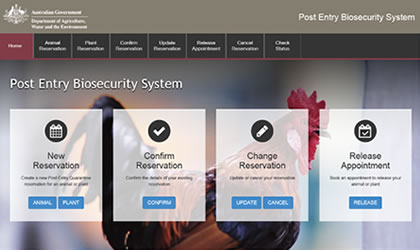
Once you have confirmed and paid for your PEBS booking reservation, please ensure you contact the airline to submit an OK to Forward Request to our booking officers. Airlines must ensure to submit an Ok to Forward Request DOCX [43KB, 1 page] for uplift approval prior to the animals arrivals.
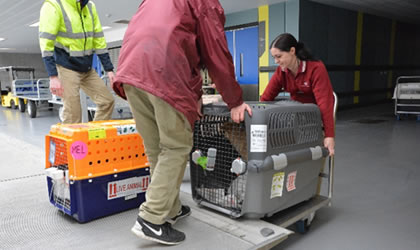
The Post Entry Quarantine facility has the following flight arrival windows for animals booked for quarantine at Mickleham.
The accepted flight times for animal arrivals into Post Entry Quarantine are:
- Monday, Tuesday, Saturday and Sunday: accept arrivals between 5:00 and 14:30.
- Wednesday, Thursday and Friday: accept arrivals between 5:00 and 21:00.
Out of hours collection fees will be charged for animals arriving on:
- Victorian or Australian public holidays
- Saturdays or Sundays
- Flights arriving after 14:30
For more information on fees and charges - Fees and charges
If you require further information about available flights that arrive within the normal and out of hours timeframes, please contact your airline or shipping agent.
If you are unsure that your flight will be accepted, please contact PEQservices@aff.gov.au for further information.
Your animal will be collected on arrival into Melbourne airport for transport directly to the Mickleham PEQ Facility.
You will receive an email notification to notify you that your animal has arrived safely, within 24 hours of arrival. We will contact you immediately if there is an issue with your animal on arrival.
We follow strict guidelines for administering medication during quarantine. This ensures the health and safety of all animals in our care.
Cytotoxic and chemotherapy medication restrictions
We DO NOT administer cytotoxic or chemotherapy medications.
If your animal requires these medications, you must:
- consult your veterinarian BEFORE ARRIVAL at PEQ to discuss alternative treatments
- stop these medications at least 7 DAYS BEFORE ARRIVAL at PEQ.
Veterinary instructions
We will only administer medication under the direction of your treating veterinarian.
You must provide a completed Animal medical declaration at the time of booking.
This form must include:
- your animal’s relevant medical history
- name and type of medication
- dosage and frequency
Labelling requirements
All medications must be clearly labelled by a veterinarian in English and include:
- details of the veterinarian and veterinary clinic
- animal’s name
- owner’s surname
- name of the medication
- dose rate
- frequency
- route of administration (oral, topical, ear or eye drops)
- date when medication was dispensed
Administration and supply
We WILL NOT administer unlabelled or unclear medications.
We DO NOT supply medication. You can arrange for a private veterinarian to prescribe and supply medication. This will be at your own cost.
We administer medications between 8:00 AM and 4:00 PM only.
Animals with conditions such as diabetes or epilepsy, may usually be medicated outside these hours. Your veterinarian will need to adjust the treatment schedule before import into Australia.
If you need more information, contact us or speak with your veterinarian.
- Animals are housed in climate controlled pens.
- Animals will be allocated an individual pen at the time of booking.
- If you are importing multiple animals, we will try to house same species ( for example, two dogs) in adjacent pens, where possible.


Royal Canin wet and dry food is the primary food provided to companion animals during their stay at the Post Entry Quarantine facility.
Royal Canin is an internationally recognised science-based pet nutrition brand, offering precise nutrition for dogs and cats in over 120 countries.
To assist in transition to our facility, you may wish to commence feeding your cat or dog Royal Canin in the months leading up to their departure. Having a familiar diet in an unfamiliar environment may ease their transition into our care.
If you need to find the best Royal Canin diet for your pet, visit www.royalcanin.com/au.
- If we approve your animal to receive a special diet, you must source the food in Australia and provide it to the PEQ facility.
- Do not send food with your animal. We will destroy any food sent with animals upon arrival due to the possible biosecurity risks associated with the food.


- Please don’t send items to the facility. We do not take responsibility for any items sent to or left at the facility.
- We will destroy all bedding, soft toys, comfort items etc that travels with the animal in their transport crate upon arrival as they become soiled during the journey.
- We will provide bedding for cats and dogs to suit their breed and age.
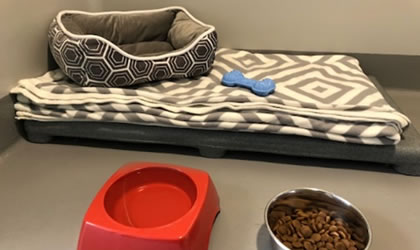
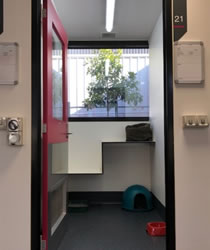
Visiting
- Under the current import conditions, most animals undergo 10 days in post entry quarantine. In this period we are focused on providing the care your animal needs, while managing the administrative and biosecurity requirements to prepare your animal for release from biosecurity control. Due to the short quarantine isolation period, we do not permit visiting of animals in post entry quarantine.
If your animal remains in quarantine for longer than expected, you may discuss visitation with the facility manager.
Exercise
- We will attend to your animal’s exercise needs during his/her time in quarantine. The runs in the facilities are well set up, and provide most animals with adequate room to exercise within their run. Where veterinary advice recommends additional exercise, we will provide this.


- We will groom and bathe animals during their quarantine isolation period for biosecurity and/or hygiene reasons only.
- We recognise some animals may require specialist grooming during the quarantine isolation period. You can discuss this requirement with the facility manager. Supervision fees will apply.
- Government veterinary officers will perform a Biosecurity Health Check and examine your animal for diseases of biosecurity concern during quarantine. Government veterinary officers will only administer treatments or medication in relation to biosecurity non-compliances. The facility does not have a clinical veterinarian or pharmaceutical medications for the management of pre-existing or chronic conditions and general health issues.
- In the event your animal requires assessment or treatment by a clinical veterinarian, a private (non‑departmental) veterinarian can be called to the Post Entry Quarantine facility to examine, treat your animal and prescribe medication, at your own cost. If you require contact information for private veterinarians, please email peqservices@aff.gov.au.
- Private veterinary fees are not included in your quarantine fees. If a private veterinarian attends and/or treats your animal, they will invoice you directly. The person-in-charge will be responsible for any costs associated with private veterinary attendances.
- If your animal is showing signs of aggression, fearfulness, stress, or anxiety and is unable to be physically examined during quarantine, we will contact you to request assistance in handling and/or physical or sedative restraint of the animal. If physical restraint is required, we will ask you to provide a suitable handler. If sedation is required, we will request you engage a private veterinarian to administer sedatives.
- If we believe your animal requires clinical veterinary attention, we will make reasonable attempts to immediately contact you or your authorised agent.
- If we cannot contact you or your authorised agent, your animal’s welfare will remain our priority and in emergency circumstances we will arrange emergency veterinary care without delay.
- Biosecurity Officers are trained in identifying diseases of biosecurity concern and assessing general health and condition of animals, however, the PEQ does not have onsite emergency veterinary facilities or specialist equipment onsite to manage veterinary emergencies. Animals with serious or chronic medical conditions will be immediately transferred to the University of Melbourne veterinary hospital (U-Vet) in Werribee, Victoria who provide emergency veterinary services to the department, where they will remain under biosecurity control and receive veterinary treatment. Any costs incurred will be invoiced directly to you by U-Vet for their treatment and is at your own expense.
The Australian quarantine facility provides an excellent standard of care to cats and dogs and is able to provide basic medication to cats and dogs with stable illnesses.
If your cat or dog has special care requirements, you and your veterinarian will need to consider the information on this page and determine if your cat or dog with special care requirements is suited to international transport and post-entry quarantine within Australia.
Does my animal have special care requirements?
A special care animal is a cat or dog that:
- has existing medical conditions
- requires medication
- requires special diets
- is elderly (cats older than 12 years, small dogs older than 10 years or large dogs older than 7 years)
- is or might be pregnant at the time of import
- has known behavioural issues e.g. is nervous or fearful during veterinary visits, takes behaviour modifying medication or is trained specifically for security, military or police purposes
- has any other special needs or requirements.
What should I consider before importing my special care animal to Australia?
Whilst your animal will be well cared for during its time at the Australian post-entry quarantine facility, you should think about the stress that your animal may experience during international travel and changes to its routine. Consider whether your cat or dog can cope with:
- travelling in the cargo hold of the plane
- stress associated with being exposed to unfamiliar environments and sensations (sound, vibrations, scents)
- being unmonitored for extended periods whilst in transit and under the care of the aircraft operator.
Stress may exacerbate pre-existing conditions or worsen the health status of animals with special care requirements. Cats and dogs with certain health issues are more likely to arrive unwell or in poor condition.
Cats and dogs that are unwell on arrival, or become unwell during quarantine, may require private veterinary attendance or transfer to a private veterinary facility at the expense of the person in charge of the animal.
I am planning to import my special care cat or dog. What do I need to do?
Follow these steps before bringing your cat or dog with special care requirements to Australia.
Pre-travel health check
Talk to your veterinarian about whether your cat or dog can cope with international travel and quarantine in relation to its special care requirements.
It is a condition of import that cats and dogs undergo a final pre-export veterinary examination by a government-approved or official government veterinarian within 5 days of the date of export to Australia. At the time of the final pre-export veterinary examination, cats and dogs must be:
- certified as healthy and fit to travel to Australian territory and undergo quarantine
- free of clinical signs of infectious and contagious disease.
You should reconsider the proposed import of your cat or dog if they are not healthy and fit to safely travel to Australia and undergo quarantine. You may need to delay your animal’s import to Australia until their health has improved.
Booking quarantine for animals with special care requirements
You must tell us if your animal has a special care requirement when you confirm your animal’s quarantine stay. We need this information to care for your animal. Please ensure the information is current at the time of your animal’s arrival in Australia.
During travel
Cats and dogs are transported as manifest cargo within the cargo hold of the aircraft. They are not monitored in transit and may miss scheduled doses of medications. Talk to your veterinarian about any issues this may cause for your animal.
You must provide enough water (and food) in the crate for your pet when they travel. This is an International Air Transport Association (IATA) requirement.
What to expect during post-entry quarantine in Australia
Australia’s post-entry quarantine facility provides excellent care for animals. The facility is state-of-the-art and designed to ensure animals are comfortable during their stay.
The facility is staffed within the daylight hours of 0800 and 1600. Care is provided during these hours; cats and dogs are not monitored outside of these hours.
Veterinary care
Our veterinarians examine incoming animals for evidence of biosecurity concerns. They do not provide general veterinary care, consultation, prescribe or dispense medication for treatment of conditions not related to biosecurity.
If we think your pet requires private veterinary attention, we will contact you or your authorised agent using the contact details provided.
Our priority is your animal’s health and welfare. If we cannot contact you or your authorised agent, we will still arrange for private veterinary care without delay. The person in charge of the animal is responsible for all costs associated with private veterinary care and will be invoiced directly by the private veterinarian.
If you would like to organise for a private veterinarian to attend to your animal during their quarantine stay, please contact the quarantine facility directly via email at least two weeks ahead of your animal’s scheduled arrival to make the necessary arrangements.
Medication
We can provide basic medication to animals with stable illnesses while they are in quarantine. For example, oral arthritis medications.
We can only administer medication between the hours of 0800 and 1600. If your cat or dog needs medication outside of these hours, talk to your veterinarian before travel to determine if it is possible for your pet’s dosing schedule to be accommodated between these hours.
You must provide enough medication for the entire quarantine period. Avoid sending excess quantities as this may not be released with your animal from the quarantine facility, due to biosecurity restrictions.
All medications must be clearly labelled by a veterinarian in English and include:
- details of the veterinarian and veterinary clinic
- animal’s name
- owner’s surname
- name of the medication
- dose rate
- frequency
- route of administration (oral, topical, ear or eye drops)
- date when medication was dispensed
Secure the medication to the outside of your animal’s transport crate.
Refrigerated medication
You cannot send refrigerated medication with your animal.
You may arrange for a private veterinarian to bring the medication to the quarantine facility when your animal arrives.
See veterinary care.
General considerations for specific special care requirements
The following information is provided as a general guide to be considered before importing your special care animal to Australia. You must talk to your veterinarian about managing your animal’s special care requirements during international transit and quarantine.
Elderly animals
Elderly animals are more likely to have underlying health conditions. They may be at increased risk of developing serious complications (such as kidney failure) due to dehydration, particularly if they do not drink enough while travelling to Australia.
Familiarise your pet with their travel crate and water bowls or drip water dispensers before they travel and ensure you provide sufficient water for your animal during travel.
Special diets
If your animal requires special food, you will need to purchase it in Australia and have it shipped to the quarantine facility at least two weeks before the animal’s arrival in Australia.
The food must be clearly labelled with the pet name, import permit number and importer name and sent to the address below:
Department of Agriculture, Fisheries and Forestry
ATTN: PEQ, Pet name, import permit number
GPO Box 858,
Canberra, Australian Capital Territory 2601
Australia
You cannot import food with your pet for consumption during the quarantine period. Any food that arrives with your pet will be destroyed on arrival due to biosecurity restrictions.
Diabetes mellitus
Before travel
Before your animal’s arrival in Australia, you must make arrangements for a private veterinarian to visit your animal in the quarantine facility. The private veterinarian will need to dispense insulin and syringes for use during quarantine. See veterinary care.
An Animal medical declaration is required for animals with diabetes mellitus.
During travel
If your animal misses insulin doses in travel, it may result in abnormally high blood glucose levels. This could lead to complications. You must talk to your veterinarian about managing your animals’ diabetes during travel and quarantine.
Diabetes makes animals thirsty and urinate more frequently. This increases the risk for dehydration during travel. Ensure you provide sufficient water for your animal during travel.
You cannot send insulin with your cat or dog because it cannot be refrigerated during travel.
After arrival
During quarantine we cannot:
- check blood glucose levels
- administer insulin outside the hours of 0800 and 1600.
You must discuss changes to insulin dosing regimens (for example, to accommodate quarantine facility opening hours) with your veterinarian before the animal is imported to Australia.
Heart and lung disease
Increased stress during travel increases heart rate and breathing in all animals. Animals with pre-existing heart or lung disease are especially sensitive to the effects of stress. The increased workload on the heart and lungs resulting from stress may have serious consequences.
Missed doses of heart medication can further contribute to sudden decline in heart function.
An Animal medical declaration is required for animals with heart and lung disease.
Cushing’s disease
Sudden changes to the dose or frequency of medication can cause adverse effects.
Dogs with Cushing’s disease experience increased thirst and urination, increasing their risk of dehydration during travel. Familiarise your pet with their travel crate and water bowls or drip water dispensers before they travel and ensure you provide sufficient water for your animal during travel.
An Animal medical declaration is required for animals with Cushing’s disease.
Cancer
We DO NOT administer cytotoxic or chemotherapy medications.
Animals with cancer may have other medical issues due to:
- the effects of the cancer
- side effects of medication.
You should carefully discuss your animal’s suitability for international transport and quarantine with your veterinarian. You may need to delay your animal’s travel to Australia until their treatment is complete. An Animal medical declaration is required for animals with cancer.
Implants or external devices
Animals may remove implants (such as sutures or feeding tubes) during transit. This could result in physical injury or infection.
Animals with implants are unlikely to be considered healthy and fit to undertake the journey to Australian territory and undergo quarantine.
Open wounds, bandages and casts
Animals with open wounds, bandages or casts are unlikely to be considered healthy and fit to undertake the journey to Australian territory and undergo quarantine. Bandages and casts may become soiled during transit leading to wound complications. Quarantine staff cannot undertake bandage or dressing changes.
Epilepsy or seizure conditions
Animals may miss seizure medication during transport which may predispose the animal to a seizure. You must talk to your veterinarian about managing your animal’s condition during travel and quarantine. We cannot give anti-seizure medications outside of the hours of 0800 and 1600.
An Animal medical declaration is required for animals with epilepsy or seizure conditions.
Mobility and body function issues
Animals with congenital or acquired disorders (for example spinal injury) resulting in an inability for the animal to rise, balance, walk, urinate, defecate or access food/water unaided are unlikely to be considered healthy and fit to undertake the journey to Australian territory and undergo quarantine.
Blind animals may be distressed by unfamiliar surroundings. They may find it difficult to drink from transport crate water dispensers so you should ensure your blind animal can access water during transport.
Behavioural considerations
Our staff need to be able to safely handle cats and dogs to assess whether they comply with import conditions and to care for your animal. If your cat or dog has a history of fearful behaviour or aggression at veterinary visits or known behavioural issues (for example, takes behaviour modifying medication please contact the quarantine facility to discuss your animal’s needs.
If you are importing a dog that is specifically trained for security, military or police purposes, please contact the quarantine facility to discuss your animal’s needs.
- We do not recommend importing sick or very elderly animals. You should consider your animal's age and condition, and how they will cope with long distance travel and climatic stress, when deciding to send your animal to Australia.
- It is the department’s experience that even animals with well managed chronic medical conditions can often arrive in Australia in a state of distress and poor health. International travel can cause them to de-stabilise and rapidly deteriorate. In accordance with the Australian live animal import conditions, animals must be transported to Australia by air as manifested cargo, in a transport crate in the cargo hold of an aircraft. During this travel, animals will be subject to a heightened level of stress with which they may not be able to cope with due to their pre-existing medical condition. Additionally, animals may be unable to receive medication during transport to Australia which may further exacerbate their condition on arrival.
- As a pet owner, you must consider whether it is in your pet’s best interests to be subject to long distance travel and the stay in quarantine. If you elect to import your pet with an underlying medical condition, the department strongly recommends that you arrange for a private veterinarian to examine your pet after their arrival at the quarantine facility. The private veterinarian can determine whether changes to your pet’s care or medication are necessary following any stress associated with importation.
- If your animal has a chronic health condition that requires close monitoring, such as epilepsy or diabetes please email us at peqservices@aff.gov.au as soon as you have submitted your reservation. This will ensure notes are made on the reservation and the biosecurity officer caring for your pet can be informed.
- You must notify us if your animal has any medical requirements when making your quarantine booking. In such circumstances, we will require additional information from your treating veterinarian to correctly manage the condition by completing an Animal medical declaration outlining the animal’s condition/s and care requirements which can be submitted to peqservices@aff.gov.au
- You must notify the peqservices@aff.gov.au if your animal is diagnosed with a medical condition after the import permit has been granted, to ensure that your animal's welfare and medical requirements can be managed at the facility.
- If your animal requires significant medical assistance by our staff, supervision fees may apply. Please contact the facility peqservices@aff.gov.au to discuss your animal’s needs.
- The animal must be certified as fit to travel and undergo quarantine and meet all import conditions in full before departing the country of export.
- Pets remain subject to biosecurity control until such time as they have completed the post-entry quarantine period and are in full compliance with the conditions of import. In the very rare instance where a pet dies in transit to Australia, on arrival or during the quarantine period, departmental policy requires the animal’s remains cannot be released from biosecurity control or returned to the owner as the import conditions have not been fulfilled. The department is unable to provide cremation services and the return of the ashes to the owner. The department will dispose of the remains at an approved biosecurity facility.
- When a pet dies in transit to Australia, on arrival or during the quarantine period the department may require a postmortem examination to be conducted to determine if the cause of death is from a disease of biosecurity concern.
Due to Australian legislative requirements and the potential biosecurity risk associated with imported veterinary medication, we may destroy any imported medication following the release of your animal, including medication that may be commercially available in Australia. As such, you should only send medication in a quantity sufficient to treat your animal during the quarantine isolation period.
- You should check whether your animal's current medication is available in Australia. If it is not, you may wish to consider changing to an equivalent medication that is available in Australia.
- You can arrange for a private veterinarian in Australia to examine your animal either during his/her quarantine isolation period or after the animal is released from biosecurity control. The veterinarian can then prescribe appropriate medication for your animal. Email the Booking and Invoicing team to arrange a suitable time for your veterinarian to attend the facility.
Please contact peqservices@aff.gov.au if your dog is trained for any of the following purposes:
- to bite a human’s body, or any object attached to a human, such as bite sleeves/suits
- is trained for security, military, police, or guard purposes, or is intended to be used for these purposes
- has undertaken training in dog sports involving biting, such as Schutzhund titled dogs - Sch, IPO, VGP and IGP.
The quarantine facility will accommodate bite trained dogs if the following Workplace Health and Safety criteria can be met:
A suitable handler is required to attend the PEQ facility to provide assistance in safe handling of your animal at the following times:
- To assist with initial arrival health check;
- At the pre-release veterinary health examination, normally within two business days of the anticipated release from biosecurity control;
- The day of release from biosecurity control;
- Other times, where requested to assist with husbandry, examination or biosecurity non compliances.
If you require information regarding suitable handlers, please contact the quarantine facility peqservices@aff.gov.au. You will need to liaise directly with your nominated handler and the quarantine facility to schedule attendance times. The person-in-charge will be responsible for any costs associated with handler attendance.
- Australian veterinarians recommend regular external parasite treatment of cats and dogs.
- We may apply additional treatments to any animals showing signs of active parasites in the facility. You are responsible for the cost of additional parasite treatments.
Heartworm disease occurs in different areas of Australia. Heartworm is caused by the microorganism Dirofilaria immitis and is spread by mosquitoes.
Your dog does not require a heartworm test or treatment to be eligible for import. Preventative treatment can be arranged through a private veterinarian, at your expense.
We administer the Biosecurity Act 2015. Our primary concern is to manage the biosecurity risk associated with imported goods, including animals.
You are responsible for investigating local animal health recommendations and compliance with state and local government legislation, including council and microchip registration requirements in Australia.
New South Wales Department of Primary Industries and Office of Local Government – NSW Pet Registry
Northern Territory Department of Primary Industry and Resources
Queensland Department of Agriculture and Fisheries
South Australia Department of Primary Industries and Regions
Tasmania Department of Primary Industries, Parks, Water and Environment
Victoria Agriculture Victoria – Department of Jobs, Precincts and Regions
Western Australia Agriculture and Food – Department of Primary Industries and Regional Development
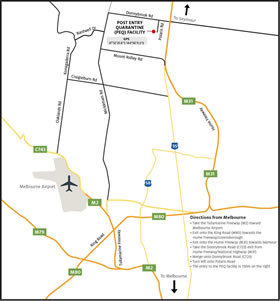
You/your authorised agent must collect your animal and their crate on the eligible release date. Animals can be collected between 10:00 and 12:00 hours.
Collection address
135 Donnybrook Road Mickleham VIC 3064, enter from Polaris Road.
Directions from Melbourne
- Take the Tullamarine Freeway (M2) toward Melbourne Airport
- Exit onto the Ring Road (M80) towards the Hume Freeway/Greensborough
- Exit onto the Hume Freeway (M31) towards Seymour
- Take the Donnybrook Road (C723)
- Turn left onto Polaris Road
- The entry to the PEQ facility is 150m on the right
- Entry is via the main gate, not the delivery gate – press the call button to speak to Security
Please note:
- Animals must be collected by the person named as importer on the import permit or their authorised agent.
- You must notify staff at the post entry quarantine facility of your authorised agent’s details before the eligible release date. Photo identification must be provided at the time of collection.
- The person in charge of the animal is responsible for the collection and removal of the animal transport crate from the PEQ facility. Forfeiture of the animal transport crate to the Department may incur additional fees for disposal.
Your animal cannot stay beyond their eligible release date. If you cannot collect your animal on the release date, you must make alternate arrangements for their pickup, boarding and care. A pet transport agency can assist. Find out more about animal transport companies from the International Pet and Animal Transport Association (IPATA).
For reservation created PRIOR to 17 October 2025
For reservation created AFTER 17 October 2025
If you have difficulty accessing these files, contact us for help.

